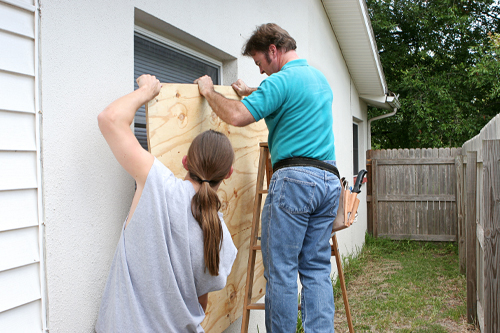5 Tips Preparing Your Home for a Natural Disaster
As states across the U.S. continue to rebuild after hurricanes and recent tornadoes, now is a good time to review how you’ll keep your home safe during an emergency. Here are some tips to help protect your family and property during a fire, flood or natural disaster.
Prepare for the Likeliest Scenarios
Review the most likely natural disasters with family members and create an action plan to keep everyone safe and together in an emergency. Focus on the kinds of disasters that are most likely to occur in your community. You can identify the most likely risks in your area by referring to this Natural Disaster Risk map.
Know How to Shut Off Key Systems
Identify the location of your home’s electric, gas and water main shutoff switches and valves. Be sure every family member knows how to turn them off in the event of an earthquake, hurricane, tornado or another type of emergency. A minor disaster could turn major if it causes a burst pipe or gas explosion. Be sure you know how to quickly shut off critical appliances if disaster strikes. If you live in a region prone to earthquakes, you should also remove or disengage rollers from major appliances to keep them from moving during a seismic event.
Prepare for Wind Damage
If the forecast calls for heavy winds due to tornadoes or hurricanes, keep trees trimmed, board up windows and remove branches or debris from your yard that could damage your roof or home. You should also take steps to reduce the risk of flooding due to heavy rains. This means cleaning your gutters and having your roof inspected for leaks. It also means having your septic tank and sewer inspected and cleaned at the start of every storm season. You should also check for small holes or cracks in your home’s foundation where water might be able to seep in.
Store Emergency Items
Every home should include a few basic emergency items, including enough clean food and water to last several days. Consider purchasing dehydrated or freeze-dried MREs along with water-purification tablets. You should also have flashlights and a battery-powered AM/FM radio so you can monitor news and weather broadcasts even if your power goes out.
Prepare for Wildfires
Although untreated wood shakes and shingles are attractive, they can’t stand up to a fire. If you live in a region where wildfires are common, consider upgrading to Class A roofing materials, which are capable of withstanding moderate to severe fire exposure. You should also consider replacing your windows with dual-pane tempered glass since it’s more resistant to the heat generated by fire.
If you can’t afford to replace your home’s roof and windows right now, you can reduce the risk of catastrophic fire damage by altering your landscaping to create fire-resistant zones. By clearing out dead branches and strategically managing vegetation, you can prevent a fire from quickly spreading to your house. Even a few extra minutes could give the fire department the time they need to control a blaze and prevent your home from burning to the ground.
2-10 HBW offers the most comprehensive Home Warranty coverage for homeowners. Let us help you protect your home.








